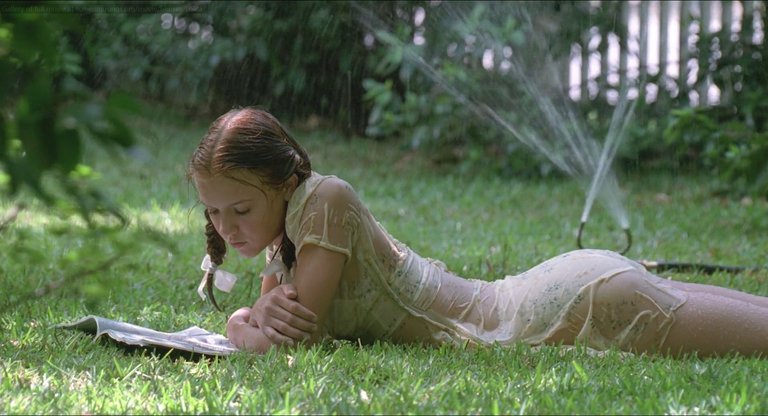
La crítica fue más dura con esta adaptación que con la anterior
Thirty-five years after Stanley Kubrick adapted Vladimir Nabokov's controversial novel to the big screen, director Adrian Lyne dared to make a new adaptation. One would think that after so many years, times were different, but it seems that deep down they were not. The book continued to be famous and infamous at the same time and society (critics and public) once again attacked the story, the author and the director, perhaps more than against Kubrick, whose version I already reviewed in a previous post (here's the link: Lolita (1962): the Kubrick's version ).
Treinta y cinco años después de que Stanley Kubrick adaptara a la gran pantalla la polémica novela de Vladimir Nabokov, el director Adrian Lyne se atrevió a hacer una nueva adaptación. Uno pensaría que después de tantos años, los tiempos eran otros, pero parece que en el fondo no lo eran. El libro seguía siendo célebre e infame a la vez y la sociedad (crítica y público) volvieron a ensañarse contra la historia, el autor y el director, acaso más que contra Kubrick, cuya versión ya reseñé en un post anterior (el enlace acá: Lolita (1962): the Kubrick's version ).
Lolita tells the story of Professor Humbert, a cultured European who settles in Ramsdale, New England, a few weeks before starting to teach. His original host has failed and Humbert rents a room in the house of the widow Charlotte Haze, a woman who is immediately attracted to him, but he is not to her. Because the respectable Professor Humbert has different inclinations that come to light when he meets Dolores (aka Dolly, aka Lo, aka Lolita), Charlotte's teenage daughter, who becomes his obsession from the first second. It was to be expected, with the novel, with its previous adaptation, and with this new version, that the pedophile (and later incestuous) relationship between Humbert and Lolita would be harshly criticized by the public. And is not for less. Although by 1997 the sexual revolution, the cold war, the dark eighties had already been left behind and society - especially North American society - seemed to be more open with almost any topic, the well-being of children and adolescents has always been sacred. They could (and can) show shootings, murders, rapes, beheadings, all that - violence is allowed and even encouraged - but not stories like Lolita. Nabokov's novel was classified as immoral since its publication and that makes me remember a phrase that Oscar Wilde says in The Picture of Dorian Gray: "The books that the world calls immoral are the ones that show the world its own shame", will it be true?
Lolita cuenta la historia del profesor Humbert, un europeo culto que se instala en Ramsdale, New England, unas semanas antes de comenzar a dar clases. Su anfitriona original ha fallado y Humbert renta una habitación en la casa de la viuda Charlotte Haze, una mujer que de inmediato se siente atraída por él, no así él por ella. Porque el respetable profesor Humbert tiene inclinaciones diferentes que salen a relucir cuando conoce a Dolores (alias Dolly, alias Lo, alias Lolita), la hija adolescente de Charlotte, quien se convierte en su obsesión desde el primer segundo. Era de esperarse, con la novela, con su adaptación anterior, y con esta nueva versión, que la relación pedofílica (y luego incestuosa) entre Humbert y Lolita fuera duramente criticada por el público. Y no es para menos. A pesar de que para 1997 ya habían quedado atrás la revolución sexual, la guerra fría, los oscuros años ochenta y la sociedad - sobre todo la norteamericana - parecía ser más abierta con casi cualquier tema, el bienestar de los niños y adolescentes siempre ha sido sagrado. Podían (y pueden) mostrarse tiroteos, asesinatos, violaciones, decapitaciones, todo eso sí - la violencia es permitida e incluso impulsada - pero no historias como Lolita. La novela de Nabokov fue catalogada de inmoral desde su publicación y eso me hace recordar una frase que dice Oscar Wilde en El retrato de Dorian Gray: "Los libros que el mundo llama inmorales son libros que muestran al mundo su propia vergüenza", ¿será cierto?
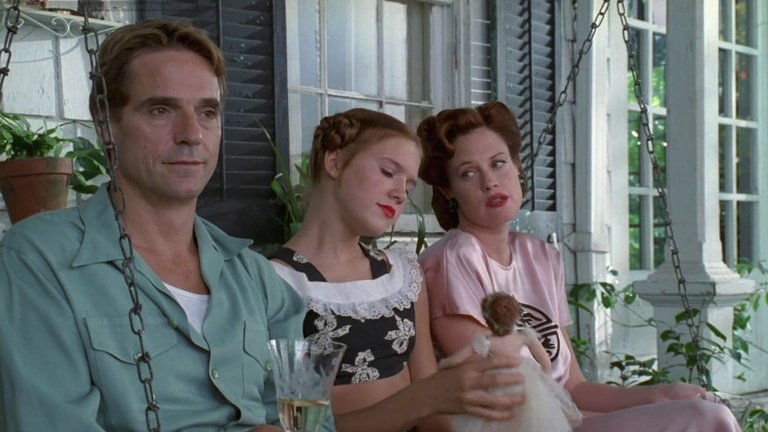
For this version, Lyne featured three top actors: Jeremy Irons as Professor Humbert, Melanie Griffith as Charlotte and Frank Langella as Quilty. I would say that I liked this casting and its performances more than those in Kubrick's version, with the exception of Griffith, whose performance seemed a little bit too much to me. I think that a properly adapted Charlotte Haze would have to be a mix between what she did in '97 and what Shelley Winters did in 1962. Langella's Quilty is much better than Sellers' hysterical one and Irons is more believable than Mason, closer to the text, although they also make it look slightly younger.
Para esta versión, Lyne contó con tres actores de primera línea: Jeremy Irons como el profesor Humbert, Melanie Griffith como Charlotte y Frank Langella como Quilty. Diría que este casting y sus actuaciones me gustaron más que los de la versión de Kubrick, con excepción de Griffith, cuya interpretación me pareció a little bit too much. Creo que una Charlotte Haze propiamente adaptada tendría que ser una mezcla entre lo que hizo ella en el '97 y lo que hizo Shelley Winters en 1962. El Quilty de Langella es mucho mejor que el histérico de Sellers y Irons resulta más creíble que Mason, más cercano al texto, aunque también lo hacen ver ligeramente más joven.
Someone may have doubts about those three performances compared to the originals, but no one could doubt that Dominique Swain is the closest thing to Dolores Haze that the big screen has ever shown. Lolita in the book is 12 years old when the story begins (twelve!), Sue Lyon's (in Kubrick's film) is about fourteen and Swain's must be between 15 and 16 (her age is not clarified in the film, but it's the age of the actress at that time) and that difference, although it may seem small and although for the purposes of the central perversion of the story it does not make much difference, it's key to understanding and appreciating the character's psyche. Because Lolita is not the childish and naive girl that one would imagine of someone who is twelve years old. She is a capricious, volatile girl, somewhat vulgar (this is what the book says) and above all precocious. And this is perhaps easier for the viewer to accept if the girl is 16 years old instead of 12. Humbert is a pedophile, there is no excuse or possible salvation for him, but Dolores realizes the fascination she exerts on him and although He is the corrupting adult who transgresses the line of what is permitted, Lolita also participates in that dynamic for various reasons. It is the age at which she begins to be interested in boys, the age of her awakening to her first sexual experiences, she no longer wants to see herself or be seen as a girl and she realizes that older boys (even such an older boy like Professor Humbert) turn to look at her.
Puede que alguien tenga dudas respecto a esas tres actuaciones en comparación con las originales, pero nadie podría dudar que Dominique Swain es lo más cercano a Dolores Haze que ha mostrado la gran pantalla. La Lolita del libro tiene 12 años cuando inicia la historia (¡doce!), la de Sue Lyon (en la película de Kubrick) tiene unos catorce y la de Swain debe tener entre 15 y 16 (su edad no es aclarada en la película, pero es la edad que tenía la actriz) y esa diferencia aunque parezca poca y aunque para efectos de la perversión central de la historia no hace mayor diferencia, sí es clave para entender y apreciar la psiquis del personaje. Porque Lolita no es la niña infantil e ingenua que uno imaginaría de alguien con doce años. Es una niña caprichosa, volátil, algo vulgar (esto lo dice el libro) y sobre todo precoz. Y esto quizás es más fácil de aceptar para el espectador si la chica tiene 16 años en vez de 12. Humbert es un pedófilo, no hay excusa ni salvación posible para él, pero Dolores se da cuenta de la fascinación que ejerce sobre él y aunque él es el adulto corruptor que trasgrede la línea de lo permitido, Lolita participa también de esa dinámica por diversas razones. Es la edad en la que se empieza a interesar por chicos, la edad de su despertar a sus primeras experiencias sexuales, ya no quiere verse ni que la vean como una niña y se da cuenta de que los chicos mayores (incluso un chico tan mayor como el profesor Humbert) voltean a mirarla.

I don't mean by this that the story of this version is better than that of '62, but rather that it is more accurate to the book, especially to the relationship between Humbert and Lolita as conceived by Nabokov, who could not show it that way in the version of Kubrick due to the time and censorship. In that dynamic, in those interactions and in the evolution of incest, Swain and Irons do reflect a certain chemistry that the actors of the original version lacked, in my opinion, which left out some important things.
No quiero decir con esto que la historia de esta versión sea mejor que la del '62 sino que es más fiel al libro, en especial a la relación entre Humbert y Lolita tal como la concibió Nabokov, quien no pudo mostrarla así en la versión de Kubrick debido a la época y a la censura. En esa dinámica, en esas interacciones y en la evolución del incesto, Swain y Irons sí reflejan cierta química de la que carecían, en mi opinión, los actores de la versión original que dejó por fuera algunas cosas importantes.
For example, the antecedent in Humbert's life called Annabel. When he was fourteen years old, Humbert fell in love with this girl his age and they shared a summer of kisses and caresses that ended a few months later when the girl died of typhus. Upon meeting Lolita, Humbert thinks of Annabel, a ghost who has always haunted him and who is the root of his fascination with nymphets (a term that is not explained in this film either, but is in the book). Of course, this is not the only reason for Humbert's deviation because the truth is that the professor has a history of psychiatric confinement since before he met Lolita and I don't know why both Kubrick and Lyne left out that part of Humbert's past. Lyne at least knew how to show the psychological debacle, the delusions of persecution and the tormented mind of the character after his escape with Lolita, but it gives the impression that he went crazy from that obsession, when the truth is that the obsession is the product of a madness that he already suffered and that later leads him to pursue and murder Quilty. Kubrick began his film with this murder, but Lyne leaves it for the end, initially showing only Humbert's escape after having shot Quilty, which in both cases works well, sowing curiosity in those who come to see the film without having read the novel.
Por ejemplo, el antecedente en la vida de Humbert llamado Annabel. Cuando tenía catorce años, Humbert se enamoró de esta chica de su edad y compartieron un verano de besos y caricias que acabó unos meses después cuando la chica murió de tifus. Al conocer a Lolita, Humbert piensa en Annabel, fantasma que lo ha perseguido desde siempre y que es la raíz de su fascinación con las nínfulas (término que tampoco se explica en esta película, pero sí en el libro). Claro que es no es la única razón de la desviación de Humbert porque lo cierto es que el profesor posee antecedentes de reclusión psiquiátrica desde antes de conocer a Lolita y no sé por qué, tanto Kubrick como Lyne, dejaron por fuera esa parte del pasado de Humbert. Lyne al menos supo mostrar la debacle psicológica, los delirios de persecuión y lo atormentada de la mente del personaje tras su huida con Lolita, pero da la impresión de que se volvió loco a partir de esa obsesión, cuando la verdad es que la obsesión es el producto de una locura que ya sufría y que luego le lleva a perseguir y asesinar a Quilty. Kubrick comenzó su película con este asesinato, pero Lyne lo deja para el final mostrando al inicio solamente la huida de Humbert después de haber disparado a Quilty, lo que en ambos casos funciona bien, sembrando la curiosidad en quienes se acercan a ver la película sin haber leído la novela.

It's true that - as critics have said - Lyne's film doesn't reflect any of the satirical, ironic and biting humor of Nabokov in the novel with its criticism of the consumer society, of plastic and motels, which was the America of the fifties. But Kubrick didn't exploit that side of the book either (the few jokes in his version are more typical of the cinema of the time with its silly jokes than the sharp eye of the Russian writer), so why blame that lack on Lyne and not to Kubrick? In terms of reputation and public impact, did Kubrick benefit from the censorship of his time and his emerging fame? Or was the criticism of the nineties more puritan than that of the distant sixties?
Es cierto que - como han dicho los críticos - la película de Lyne no refleja nada del humor satírico, irónico y mordaz de Nabokov en la novela con su crítica a la sociedad de consumo, del plástico y los moteles, que era la Norteamérica de los años cincuenta. Pero Kubrick tampoco explotó ese lado del libro (las pocas bromas que hay en su versión son más propias del cine de la época con sus chistes tontos que del ojo agudo del escritor ruso), entonces ¿por qué achacarle esa falta a Lyne y no así a Kubrick? En cuanto a reputación y repercusión pública, ¿se benefició Kubrick de la censura de su época y de su emergente fama? ¿o acaso la crítica de los años noventa era más puritana que la de los lejanos años sesenta?
Lyne's adaptation has some flaws in common with Kubrick's (the absence of Humbert's psychiatric past, the lack of Nabokov's dark humor), but it includes important additions that the first version left out, such as the story of Annabel, the final destiny of Humbert and Lolita (which is not even apparent in the '62 version) and although it might be uncomfortable to watch and condemnable for some, Lyne did include openly erotic scenes between the characters, although, it must be said, with a hypersexualized Domnique Swain. Eroticism - deviant, perverse, incestuous, pedophilic - is a relevant point of Nabokov's novel and Kubrick almost didn't show it (partly due to censorship at the time). Lyne did. And if we add to that the good editing, the script by Stephen Schiff and the music by the genius Ennio Morricone, we obtain a dramatic film that, although it has flaws, which it does, no matter how excessive it may seem to us and no matter how much we repudiate the story, it's more faithful to the spirit of Nabokov's novel (the entirety of which will never be shown on screen) than Kubrick's version. So which version is better? Almost thirty years have passed since the premiere of Lyne's Lolita and the world has changed a lot, but people continue reading the novel, commenting on it and condemning it. Will they dare to make another adaptation of this story? How would today's society receive a plot like this? I read you in the comments.
La adaptación de Lyne tiene algunas fallas en común con la de Kubrick (la ausencia del pasado psiquiátrico de Humbert, la falta del humor negro de Nabokov), pero incluye adiciones importantes que la primera versión dejó por fuera, como la historia de Annabel, el destino final de Humbert y Lolita (que ni se asoma en la versión del '62) y aunque sea incómodo de ver y resulte condenable para algunos, Lyne sí incluyó escenas abiertamente eróticas entre los personajes, eso sí, hay que decirlo, con una hipersexualizada Domnique Swain. El erotismo - desviado, perverso, incestuoso, pedófilo - es un punto relevante de la novela de Nabokov y Kubrick casi no lo mostró (en parte debido a la censura de la época). Lyne sí lo hizo. Y si a eso agregamos el buen montaje, el guión de Stephen Schiff y la música del genio Ennio Morricone, obtenemos una película dramática que, aunque tenga defectos, que los tiene, por excesiva que nos parezca y por más que repudiemos la historia que nos cuenta, es más fiel al espítitu de la novela de Nabokov (cuya totalidad jamás podrá mostrarse en la pantalla) que la versión de Kubrick. Entonces, ¿cuál versión es mejor? Casi treinta años han pasado desde el estreno de la Lolita de Lyne y el mundo ha cambiado mucho, pero la gente sigue leyendo la novela, comentándola y condenándola, ¿se atreverán a hacer otra adaptación de esta historia? ¿cómo recibiría la sociedad actual una trama como esta? Los leo en los comentarios.
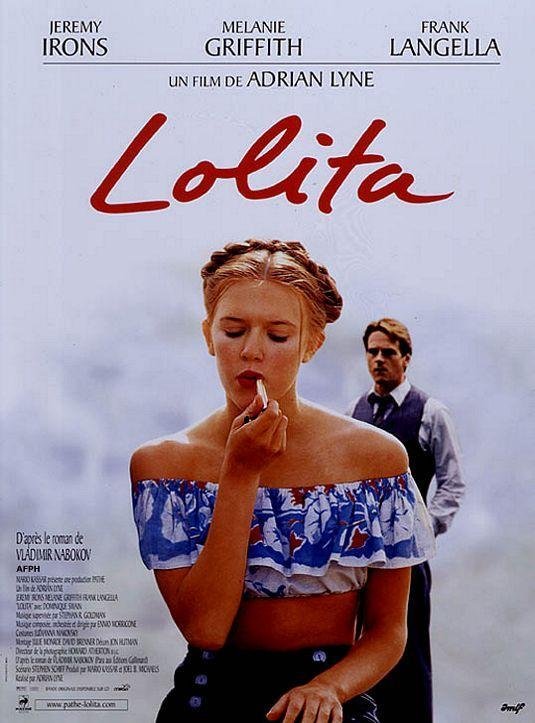
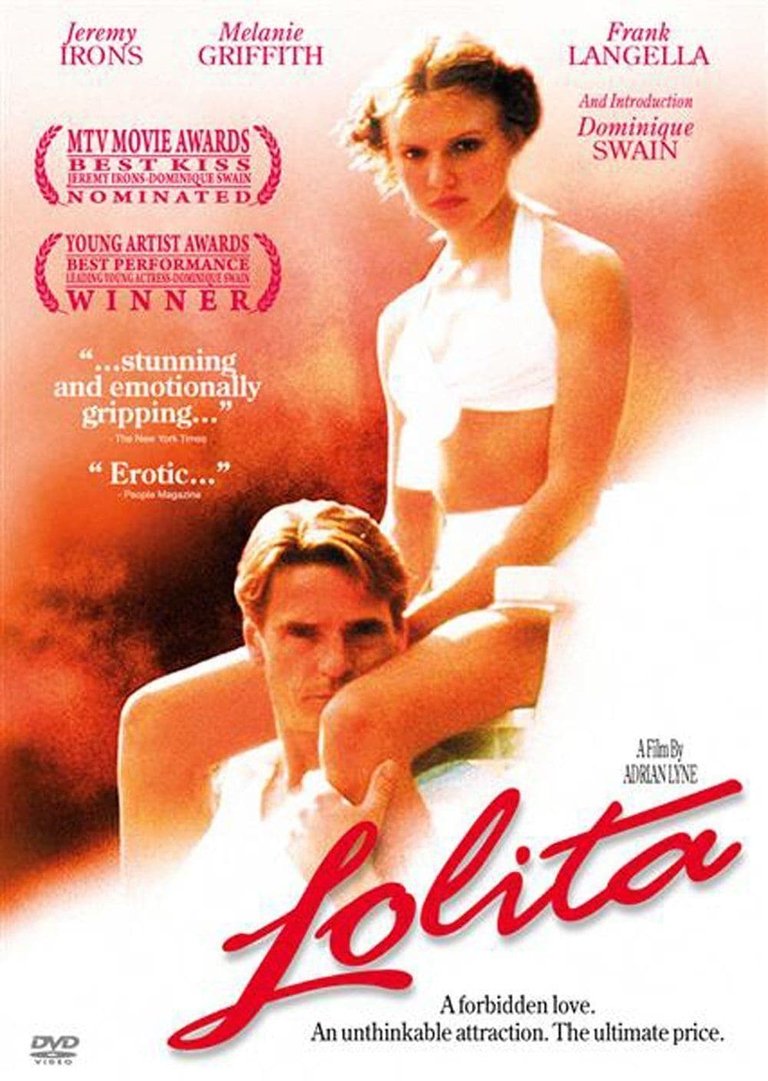
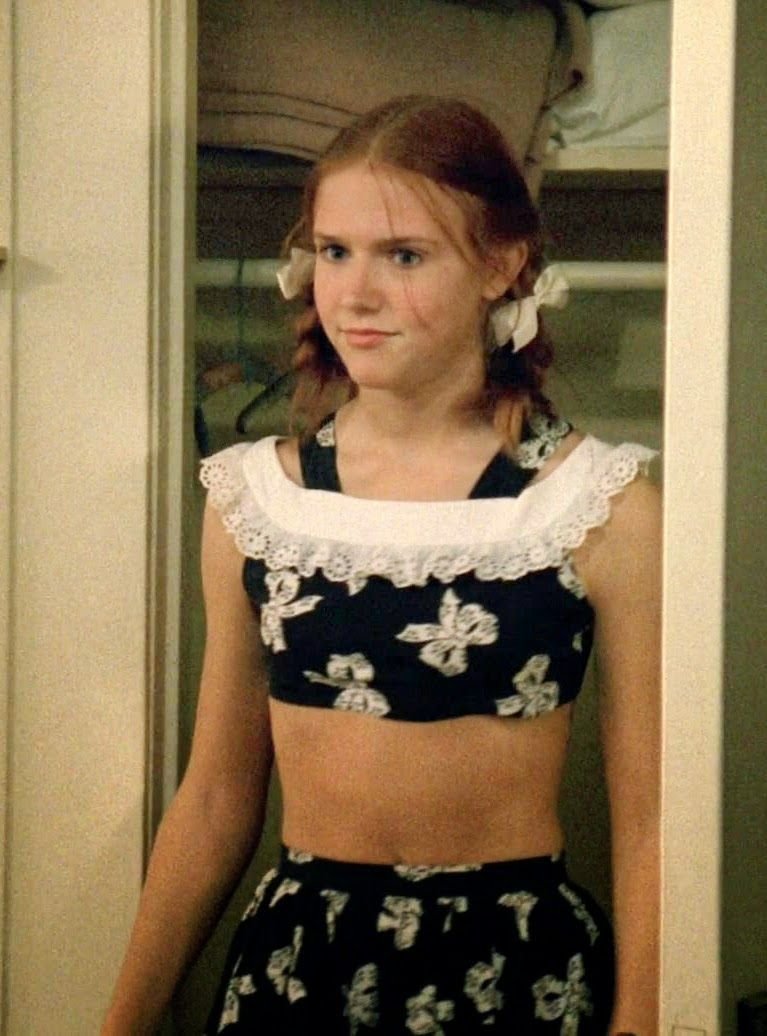
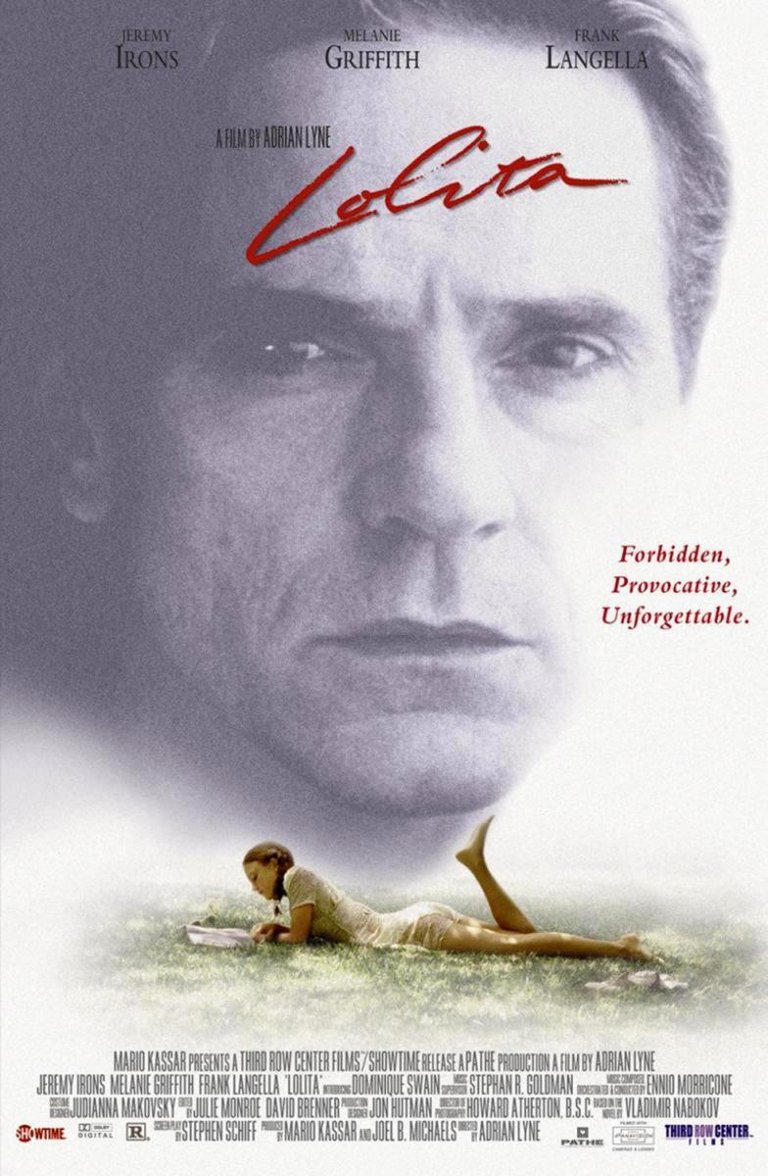
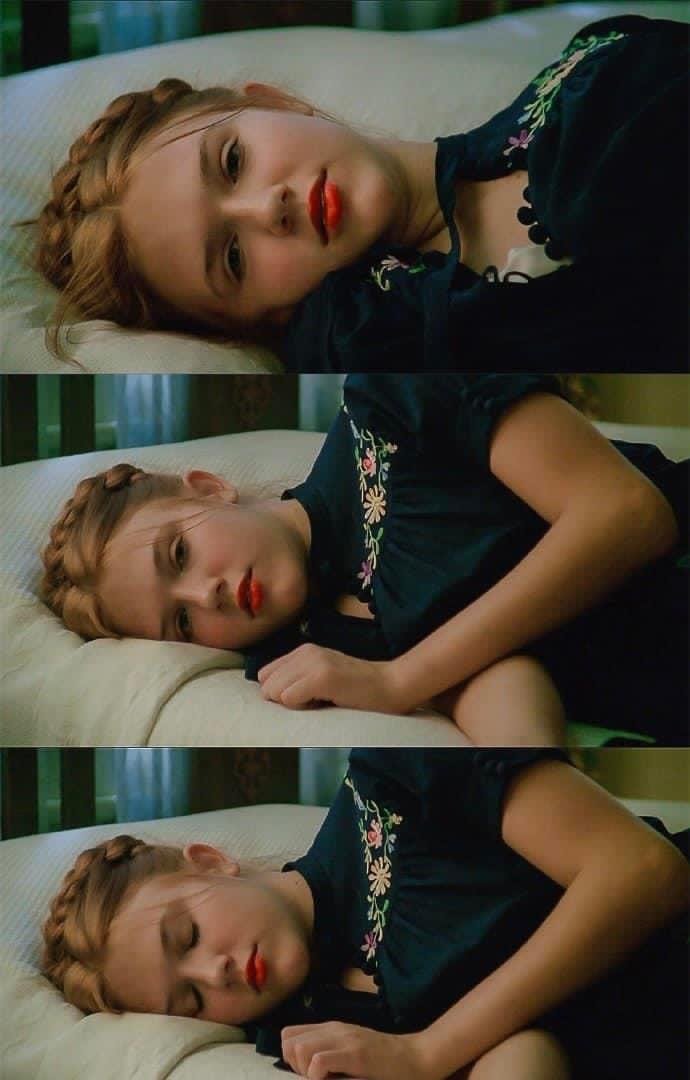
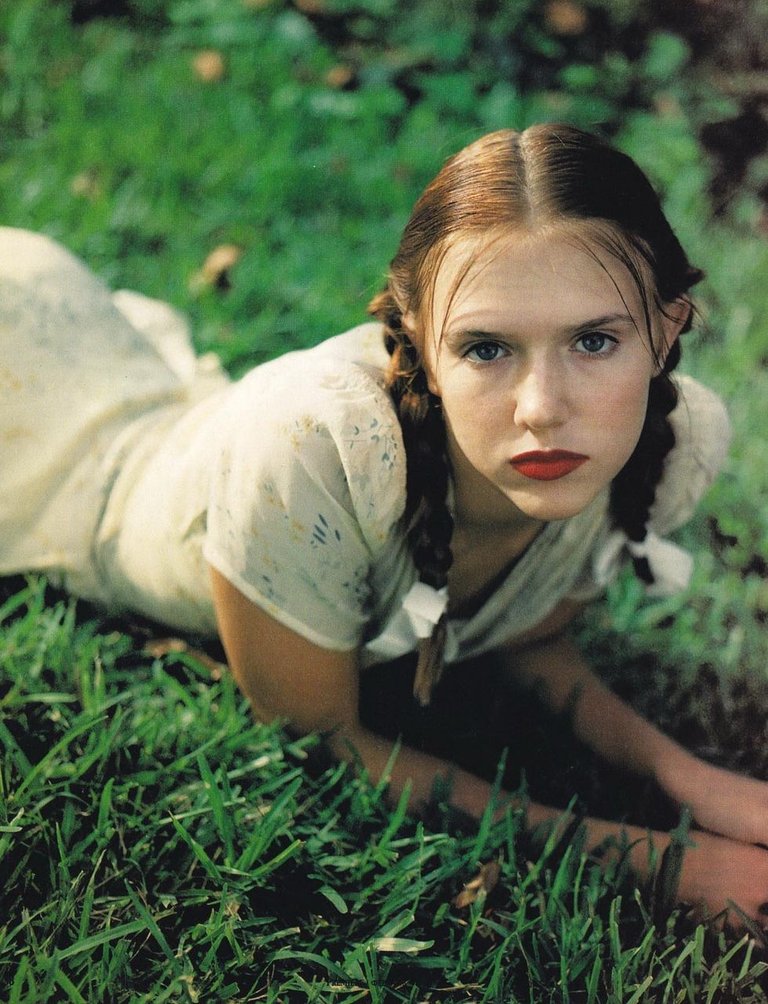
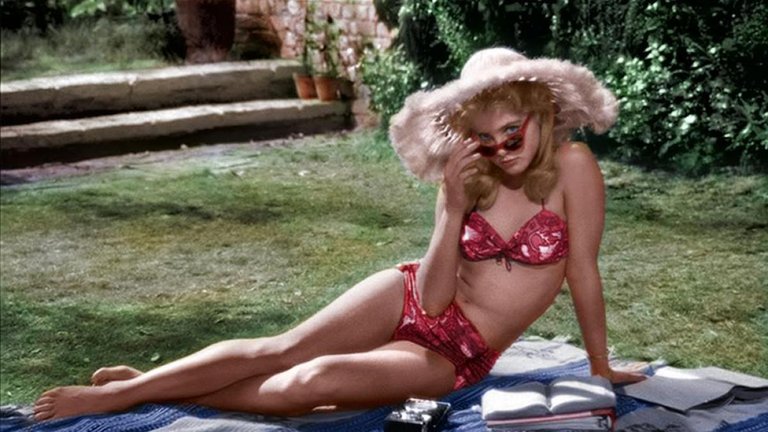
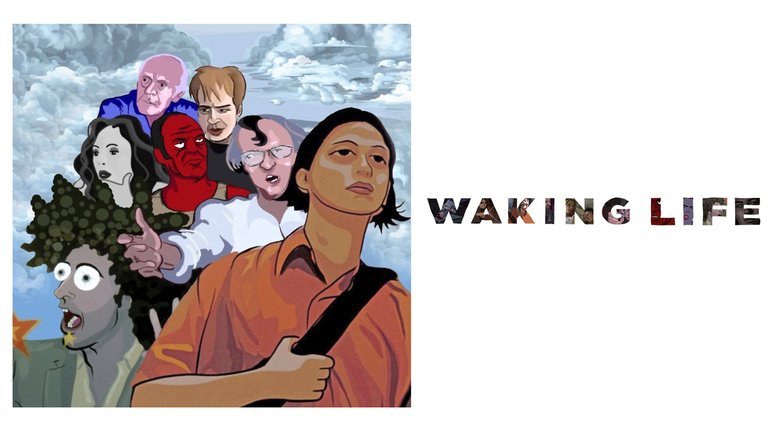
Excelente tu crítica comparativa de las dos versiones de Lolita (la de Kubrick y la de Lyne), con la presentación de sus similitudes y diferencias, y los valores de una y otra ante la historia de la novela de Nabokov. Gracias y saludos, @cristiancaicedo.